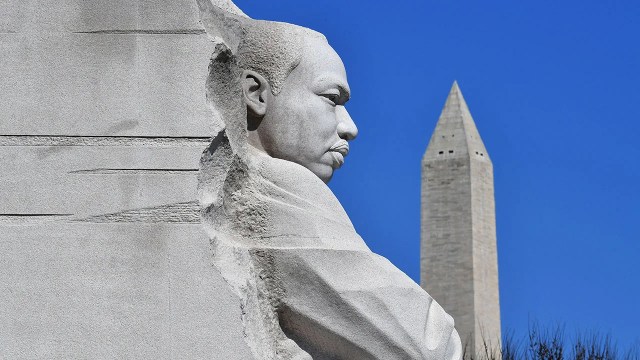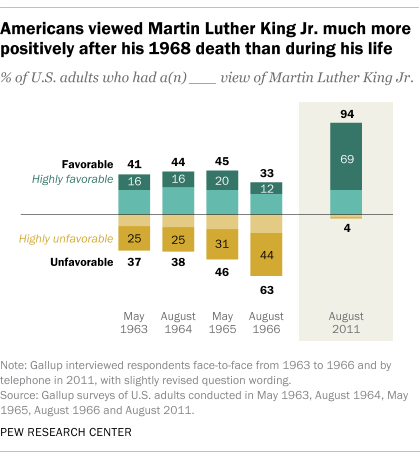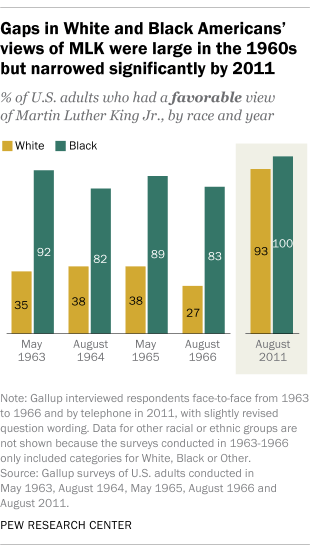
About eight-in-ten American adults (81%) say civil rights leader Martin Luther King Jr. has had a positive impact on the United States, according to a Pew Research Center report that comes ahead of the 60th anniversary of the March on Washington for Jobs and Freedom. This majority includes nearly half of Americans (47%) who say King’s impact has been very positive. Just 3% say his impact on the country has been negative.
Sixty years after Martin Luther King Jr. gave his “I Have a Dream” speech at the March on Washington, Pew Research Center conducted this analysis to determine how views of King have changed over time in the United States.
This analysis uses data from a 2023 Center survey as well as data from Gallup surveys conducted in May 1963, August 1964, May 1965, August 1966, May 1969 and August 2011. The Center survey polled 5,073 U.S. adults from April 10 to April 16, 2023. Everyone who took part is a member of the Center’s American Trends Panel (ATP), an online survey panel that is recruited through national, random sampling of residential addresses. Address-based sampling ensures that nearly all U.S. adults have a chance of selection. The survey is weighted to be representative of the U.S. adult population by gender, race, ethnicity, partisan affiliation, education and other categories. Read more about the ATP’s methodology.
Here are the Pew Research Center survey questions used for this analysis, along with responses, and the survey methodology.
However, views of King haven’t always been so positive.

In May 1963, only about four-in-ten Americans (41%) had a favorable opinion of King, according to a Gallup survey. That included just 16% who viewed him highly favorably, rating him +4 or +5 on a scale of -5 (most unfavorable) to +5 (most favorable). The survey was conducted shortly after King’s Birmingham Campaign, which led the Alabama city to remove signs enforcing segregation of restrooms and drinking fountains and to desegregate lunch counters.
King’s favorable ratings remained about the same in Gallup surveys conducted in 1964 and 1965. But by August 1966, only a third of Americans had a favorable view of the civil rights leader. More than six-in-ten (63%) viewed him unfavorably, including 44% who viewed him highly unfavorably.
Gallup’s survey questions about King between 1963 and 1966 coincided with his civil rights work in a variety of areas:
- In August 1963, King delivered the “I Have a Dream” speech during the March on Washington.
- In June 1964, he demanded equal treatment at a segregated Florida restaurant, an act that led to his arrest.
- In December 1964, he received the Nobel Peace Prize and pledged the full financial award to civil rights efforts.
- In March 1965, he led a civil rights march from Selma, Alabama, to the state capital of Montgomery.
- In June 1966, he completed fellow civil rights leader James Meredith’s March Against Fear after Meredith was wounded by a White gunman.
- In August 1966, he was hit by a rock while marching through an all-White neighborhood in Chicago as part of the Chicago Freedom Movement. The movement sought to expand civil rights work to northern U.S. cities.
King was assassinated in April 1968 in Memphis, Tennessee. Gallup did not ask Americans to rate King again until August 2011, when the Martin Luther King Jr. Memorial was officially dedicated in Washington, D.C. By then, views of King had changed dramatically, as 94% of Americans had a favorable opinion of him. Americans were also broadly supportive of the memorial: 91% approved of it and 70% were at least somewhat interested in visiting it, according to the Gallup survey.
Racial differences in views of King

Throughout the mid-1960s, Black Americans had much more favorable views of King than White Americans did. In the May 1963 Gallup survey, for example, 92% of Black Americans but only 35% of White Americans had a favorable opinion of the civil rights leader.
As more White Americans learned who King was over the next three years, a higher share of them viewed him unfavorably. Around four-in-ten White adults (41%) had an unfavorable view of King in May 1963 – a figure that rose to 69% by August 1966.
In 1969, Gallup asked Black adults in the U.S. whether they thought King’s beliefs about nonviolence had gained or lost support since his assassination a year earlier. About half of Black Americans (52%) said they thought King’s beliefs had lost support, while 30% said his beliefs had gained support.
By 2011, White Americans’ attitudes toward King had become much more positive. Fully 100% of Black adults and 93% of White adults had a favorable opinion of him, and majorities of both Black and White Americans (96% and 65%, respectively) had highly favorable views of him.
Views of racial equality after King
More than 40 years after King’s assassination, Americans were still divided on whether his dream of racial equality had been realized. In the 2011 Gallup survey, 51% of Americans said King’s dream had been realized, while 49% said it had not.
Pew Research Center’s new report, which uses survey data from April 2023, finds that Americans are similarly divided today about whether the U.S. has made progress on racial equality over the last 60 years.
About half of U.S. adults (52%) say that the country has made a great deal or a fair amount of progress, while 33% say it has made some progress and 15% say it has not made much or any progress. But Black Americans are more pessimistic: Just 30% say the U.S. has made a great deal or a fair amount of progress, compared with 58% of White adults. And 32% of Black adults say the country has made little or no progress, compared with 11% of White adults.
Note: Here are the Pew Research Center survey questions used for this analysis, along with responses, and the survey methodology.


